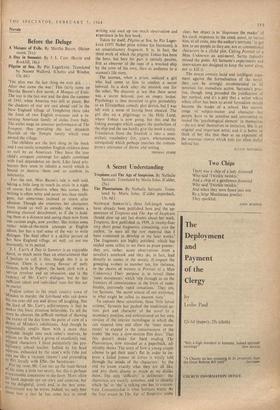A Secret Understanding
NATHALIE SARRAIII Ifs three full-length novels have already been published here and the ap- pearance of Tropisms and The Age of Suspicion should clear up any last doubts about her work. Tropisms, first published in 1939, is twenty-four very short prose fragments, containing, says the author, 'in mice all the raw material that I have continued to develop in my later works.' The fragments are highly polished, which has misled some critics to see them as prose poems: they are, rather, acute observations from a novelist's notebook and they do, in fact, lead directly to scenes in the novels. (Compare the gossiping women in number ten, for instance, to the chorus of women in Portrait of a Man Unknown.) Their purpose is to reveal those 'inner movements' which 'slip through us on the frontiers of consciousness in the form of unde- finable, extremely rapid sensations.' They are, for Sarraute, 'the secret source of our existence, in What might be called its nascent -state.'
To capture these sensations, these 'little larval actions,' Sarraute has pushed the traditional ac- tion, plot and character of the novel to a secondary position, and concentrated on her own, version of the interior monologue in which she can suspend time and allow the 'inner move- ments' to expand in the consciousness of the reader 'the way a slow-motion film does.' That this doesn't make for hard reading The Planetarium, now reissued as a paperback, ad- mirably shows. The story of how a young couple scheme to get their aunt's flat in order to im- press a failed femme de lettres is wittily told through the minds of the characters: by the end we know exactly what they are all like, and pity them almost as much as we dislike them. The only 'difficulty' is deliberate: the characters are usually nameless, and to identify which 'he' or 'she' is talking one has to concen- trate. Concentranon is what Sarraute wants. As the four essays in The Age of Suspicion make clear, her object is to 'dispossess the reader' of his stock responses to the stock novel, to 'entice him, at all costs, into the author's territory,' to get him to see people as they are, not as conventional characters in a clicha plot. Calling Portrait of a Man Unknown an anti-novel, Sartre typically missed the point. All Sarraute's experiments and innovations are designed to keep the novel alive, not to kill it.
The essays contain lucid and intelligent argu- ment against the formalisation of the novel; they can be strongly recommended to all novelists for immediate action. Sarraute's prac- tice, though, long preceded the justification of her method, and it's a pity that a writer whose whole effort has been to avoid formalism should become the leader of a school. Her narrow range of subject-matter and character---her people have to be sensitive and introverted to record the 'psychological element' in themselves —do not lend themselves to imitation. She is an original and important artist, and it is better to think of her like that than as an exponent of the nouveau roman which toils (so often dully) behind her.
JULIAN MITCHELL






































 Previous page
Previous page